JACKSON, Miss.—In 2021, Tony Gilmer was grieving the loss of his grandmother, who passed away from a heart attack, an incident in which he, as a firefighter and EMT, had to operate on her. In the midst of later processing his emotions, he woke up one day and determined he needed to find something constructive to do. Working out was not cutting it anymore, and he was struggling to think of anything that could help him cope.
A few weeks later, an old high-school classmate and music artist Neicey Mo reached out to him and invited him to her music-video set. Since he was off work that day, he decided to swing by. At the shoot, the two began talking about music with Gilmer informing Mo that he had been considering a career in the industry.
“What would you think if I were the producer of the sound?” he asked her.
Necey Mo knew of Gilmer’s musical background from his time singing in choir as a kid through college to his love of classical music like that of Bach and Beethoven. Growing up, Gilmer’s parents and siblings played a variety of genres in the home that influenced him, including R&B, funk, hip-hop and boy band.
“Yeah, I think you should give it a shot,” she replied after some thought.
Encouraged by her affirming words, the firefighter went out and bought an old drum machine and used his iPad to produce his first song. At first, he lacked confidence in his knowledge and ability, but he overcame his hesitation and released the song, which received positive reactions from his family and friends.
“People was like, ‘This is not bad,’ and I think in that moment for me it was like, ‘What if I was to really get better at this? What if I learned this? What if I really invested time in it? Ain’t no telling how far it can go,’” Gilmer told the Mississippi Free Press.
“That’s when it finally clicked for me.”
‘Full Circle’
In the year since Gilmer started producing under the name TG-18, he has released nine EPs and three albums. The artist dons an astronaut helmet and jacket when he performs, a callback to his childhood fascination with astronomy. At night, he and his siblings would go outside and look at the stars, and he often watched space-themed TV series on PBS.
“I wanted to pick something that was genuine to me and something that was personal,” Gilmer said. “I love looking at space. I love looking at stars, planets, and moons. … And when I came up with my name TG-18, it sounded like a spaceship.”
Gilmer does not limit himself to one particular genre, instead making music based on how he feels at the time. If he wakes up one day in an R&B mood, he creates an appropriate beat of that type, for example.
“I’m the astronaut behind the music,” Gilmer said. “My outer space is the notes. The planets are the chords. So I’m basically making a whole solar system of my own with every song that I make.”
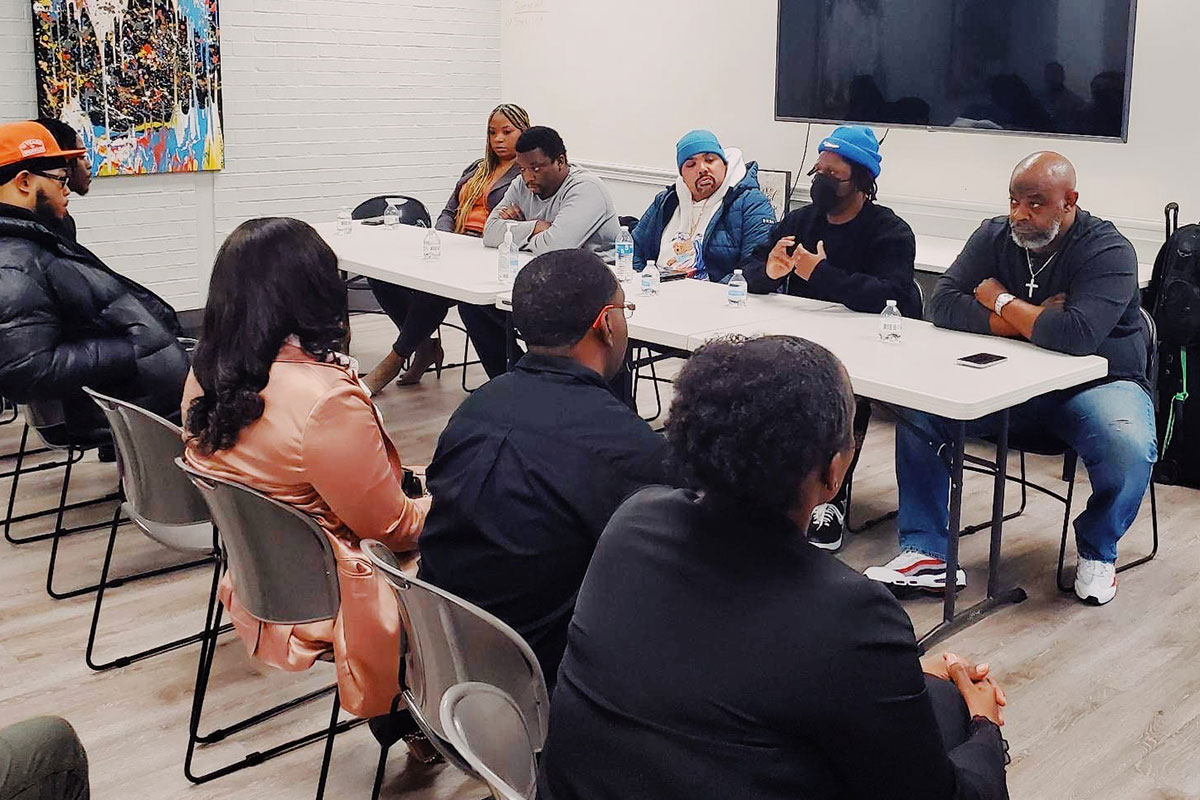
Gilmer lives in Utica, Miss., which is 35 miles from the capital city. Though Utica has a music scene, Jackson’s is bigger and better known. He found himself trying to appeal to the music scene in his hometown and to integrate himself into Jackson’s musical landscape, he said.
“One of the challenges of being someone that’s new in anything is (that) you want people to know that you’re serious and this is not just a phase,” he said. “When I first started making beats, and I was telling people, it was kind of like, ‘Oh, OK. I guess that’s good.’”
“It was definitely a challenge just from the fact of me being a newcomer and then trying to get to a place where I could reach like, ‘Would you be willing to work with me?’” he continued.
This year, Tony Gilmer decided to attend Jackson Indie Music Week, an annual event that brings attention to local music artists, for the first time. As an emerging producer, he wanted to get out of his shell and show his face for those who knew his music, but not the man behind it. On Saturday, Jan. 14, he attended the “Do the Knowledge” panel, which brought together music experts from various facets of the music industry to give advice on topics like branding, marketing, publishing and more.
Gilmer was one of many artists and producers in the room, and the three lessons he took from the panel were the importance of networking, that you do not have to leave Mississippi to build an empire and the need to know who is in the room with you.
“It’s amazing how things come full circle,” the producer said. “I’m in front of people that I grew up to. Like, I’m sitting beside Boo Rossini … and I told him, ‘I remember you back when you was Boo the Boss Player.’”
“I remember Finesse when he was known for the Hip Hop Chop Shop on Friday nights,” Gilmer added. “I went from listening to these people to … presenting music to these people. And they lock me in as they contact, and they say (to) just give ’em a call.”
‘Control Your Own Destiny’
CORE DJs President DJ Finesse said that managing a budget as an independent artist can be both a pro and a con. Signing to a major label means that a musician has access to more funds for projects, though Finesse said that artists attached to labels sometimes have less control over the individual decisions of their careers.
“You don’t control your budget—somebody else is telling you how we’re gonna spend your money,” he explained during the panel. “The advantage (to being independent) is you can hire the same people (labels) hire. All you gotta do is find their budget. It’s real easy to hire the same marketing companies, the same attorneys, the same promotion companies to give you that same visibility.”
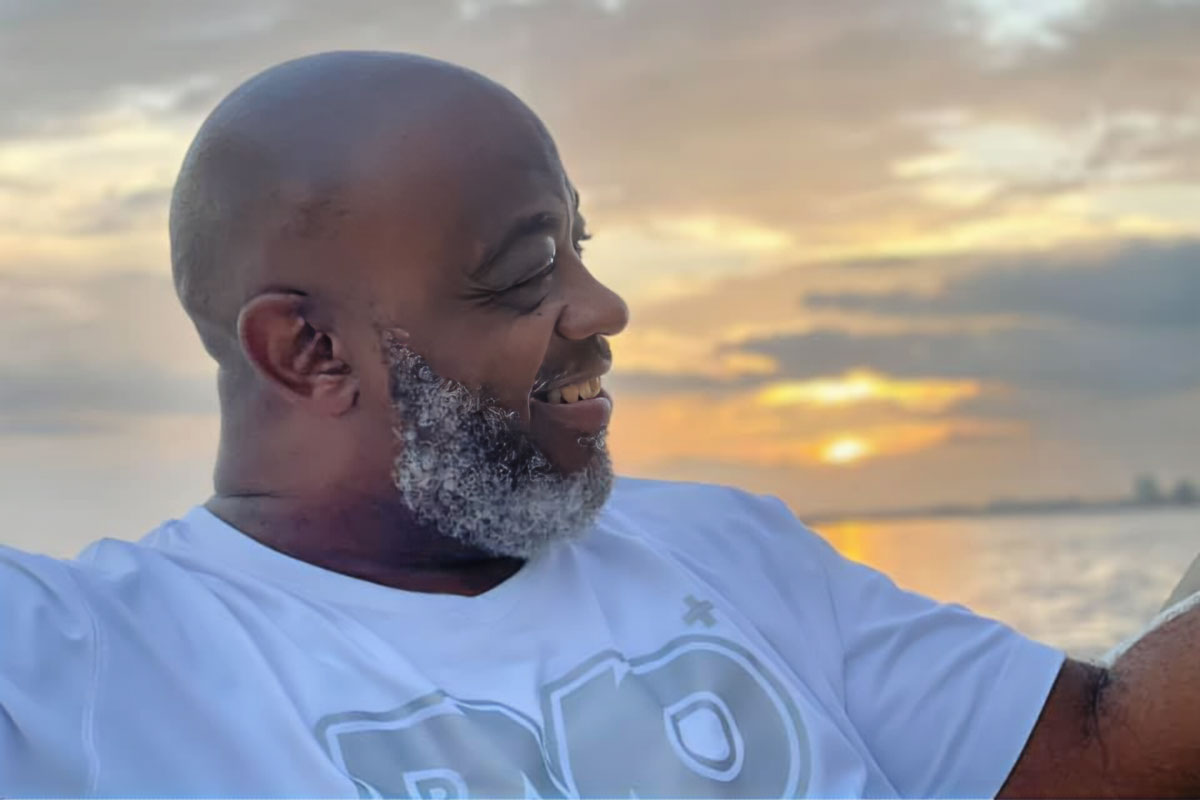
The music business regularly evolves, and the playing field has been leveled with digital distribution and marketing through social media. Creators can drop singles and albums on streaming platforms whenever they want, with the world able to hear it instantly, as opposed to pressing records and driving them out to stores, as was once the common and generally mandatory practice for distributing music.
“You control your own destiny,” Finesse said. “Nobody can tell you when and when not to put music together.”
“Another pitfall is trying to sound different, figuring out how to differentiate yourself from other artists,” NPR Tiny Desk producer Bobby Carter said. “A lot of these people are sounding the same. You really have to study and figure out, ‘What is going to be my angle?’ Being an independent artist isn’t necessarily getting on the radio. Success isn’t necessarily blowing up, per se.”
Copyright attorney Kamel King said artists should be brutally honest with themselves and question what exactly they want to accomplish.
“If you get on with a major label, then you gotta make sure you know what you’re doing and make the terms as short as possible,” King said. “You make the leash as long as possible. You get as much as you can out of it and you work the system.”
“You learn everything you can so that when that ends, then you have now robbed them for their machine,” he continued. “You didn’t get your money on the top end, but you got the knowledge and the connections.”
Artist manager Fallon Brewster said musicians often jump out too quickly, whether it be by putting a song out without knowing all the ways you can get paid from it, not protecting the song or doing splits right while in the studio.
“So splits—making sure that whoever is involved in that song and however y’all agree upon it—put that in writing before you leave that room,” she said. “Before you complete that song, put it in writing and send it to everybody so that everybody is clear.”
Piggybacking off Brewster’s point, two-time Grammy-nominated producer Got Koke advised writers, producers and engineers to understand the processes regarding work-for-hire, split sheets and knowing the sources of royalties.
“It’s not just BMI and ASCAP; those are performance rights, but you also have to deal with administration of your publishing,” the producer said. “Your publishing is everything else outside of performance rights, whether it’s on TV, movies, Tik Tok, and all that. That’s your licensing, so learn about that and get your paperwork together on that end.”
‘From My Soul’
Kristen Walker, stage name Flowerchile, grew up in a household with no shortage of music played. The Newton, Miss., native had a mother with an eclectic musical taste, which allowed her to grow up listening to various genres of music. She sang at her local church and accepted roles in a local theater company in her hometown, participating in musicals and fostering a love for performance.
“I definitely think it has helped me to navigate (music) in a way that I’m very versatile,” Walker said. “… I also think it keeps me rooted in creating things that feel good, in making things from my soul and my gut. And that keeps me courageous in the things I want to try and experiment with as far as building and creating a sound for myself.”
As a child, Walker’s mother bought her a blank storybook, in which she would write short stories, poems and song lyrics. The singer-songwriter credits her mother with providing the resources and avenues that helped her explore her creativity. As she grew older, Walker used her writing skills as a means of expression, she said.
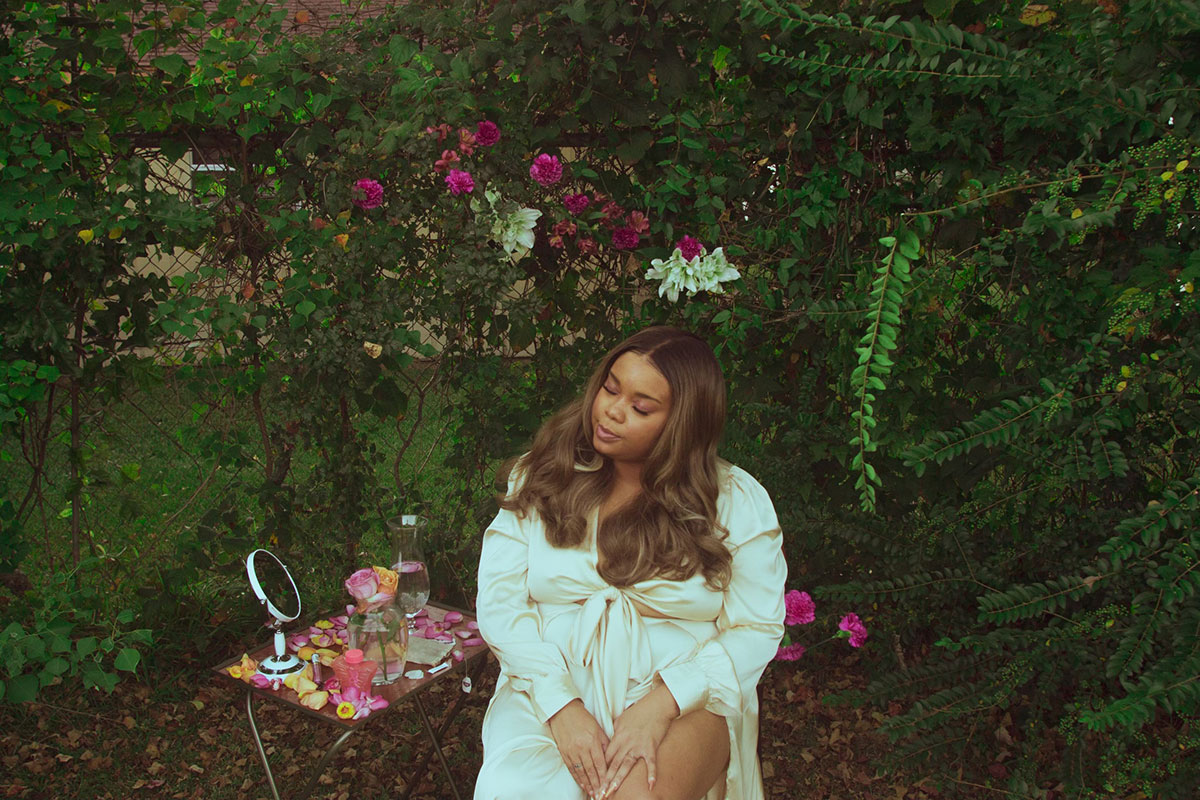
While singing remained a passion through her young life, Walker did not begin pursuing music professionally until after she graduated from the University of Mississippi in Oxford in December 2017.
“Pursuing (singing) came from not really being passionate about my nine-to-five,” she explained. “I tell people all the time, my day job is my side hustle. So, curating a way to just create joy in life everyday, diligently and purposely doing something that I love to do, I think nowadays that is just a radical movement that you can do.”
Around 2017, she began participating in Oxford’s local music scene, which she described as “gorgeous” and filled with talented artists who were growing into their styles, as well as veteran artists like local producer and singer Fred Nice who were able to be a guiding light for up-and-coming musicians.
Her first recorded feature was with Martye Franks, with whom she would later go on to do another collaboration. She also featured her talent alongside Deja Samuels, a singer and photographer in the area; Teddy Vuitton, a producer in the city; and DJ Fury.
“I think because Ole Miss is such a prevalent go-to when people think about Oxford, Miss., they really don’t think about the fact that it’s like a whole other world, and that includes the creative scene,” Walker said.
Flowerchile eventually moved to Jackson, where she has family on her father’s side, including her grandmother. She decided to perform during Jackson Indie Music Week a few years ago, with her 2023 appearance marking her third year participating with the annual event. When she first performed, she did not yet have her own project available to the public, but she was eager to network with other artists in the area.
“From there, it was just about growing people into the idea that I was a singer and that I was part of the community here,” Walker said. “I didn’t make any connections as far as business is concerned, but I definitely have people who I consider more family than friends like Charity—people know her as Vitamin Cea—and Yung Jewelz.”

This year, though, Flowerchilde had a full body of work. She has released new singles that she promoted during the January event, and she focused on meeting people more so than in previous years. She attended the “Do the Knowledge” panel to gather insights on how she could nurture her artistic development and grow as a business.
“I think just being aware of what protecting your work is, understanding its value and understanding the business of what we’re doing and not looking at it like homework or a chore (is what I found meaningful),” Walker said of her takeaways from the panel. “Just looking at it as something that can truly empower you for your next steps moving forward (helps).”
The singer also learned that forming relationships organically is important, and she aspires to ensure her work is protected and that she builds infrastructures around her art in a way that suits her.
“(Through these means), I can create some kind of legacy because I very much want to build a family, if God blesses me to do that,” Walker said. “And I want to be able to say, ‘This is what your mommy did. Even if you don’t take the same path, this is proof that it can be done and you can do whatever you want.’”
Copyright: ‘Don’t Cut the Corners’
Kamel King cited copyrighting as a key component of protecting one’s intellectual property. When a musician copyrights a song, the process prevents people from stealing it or using it without permission.
“Everybody believes in the poor man’s copyright—that you can mail it to yourself and things like that,” the attorney said. “That’s not the way to do it. You can’t sue anybody in federal copyright of litigation without a true copyright, so you gotta have a real copy. Don’t cut the corners or cut those small fees.”
Fallon Brewster advised artists to clarify their brands and make them look consistent across all social-media platforms, making them easier for consumers to identify.
“When people are searching you on Google and you’re going to get verified, all of that consistency matters,” Brewster said. “I’m always speaking from experience—because when we did not get verified the first time, that was why. If you are looking to get verified, everything from your bio to the name has to be the same across the different platforms.”
Speakers at the panel also noted that music artists benefit from constructing their own business plans and establishing a business-oriented email address, even if they do not have representation.

Producer Got Koke advised artists to have a discerning spirit for the relationships they are building. The industry is not for the weak, he said.
“A relationship ain’t built in one meeting,” DJ Finesse added to the conversation. “The biggest misconception about radio and this music business is that everything is money driven. No, you have to pay somebody who has the relationship(s) you don’t.”
NPR Tiny Desk does not make money from its content and thus does not pay artists who come to the platform, so building relationships matters, show producer Bobby Carter said. Checking in on somebody by sending a quick direct message or a thank-you gift, something to stay on that person’s mind, goes a long way, he added.
“If you’re looking to get something out of somebody, just check in on them—’cause you never know when you pop up in their head,” Carter said. “So, yes, (a significant portion of finding success in the music industry is) obviously relationships, but it’s nurturing those relationships, and it’s not always hitting somebody up when you need something.”
‘A Growing Process’
At church summer camp, an 8-year-old Gluckstadt, Miss., native Allen Kelly watched his cousin Marquel make beats during his breaks. Kelly would pay close attention, trying to pick up on every minute detail of the process. In 2015, Kelly made his first beat after receiving a laptop along with a 25-key keyboard for Christmas.
“At the time, I don’t know what I’m doing,” Kelly said. “I don’t know the software. I’m just programming drums and trying to make something. It was a growing process.”
His parents played a variety of genres around the house, with Kelly noting producers such as Quincy Jones, Jimmy Jam and Terry Lewis, and Timbaland as early influences. Kelly’s mother is the choir director at his church, where she also plays the piano. Kelly, himself, plays trombone in his high-school marching band.
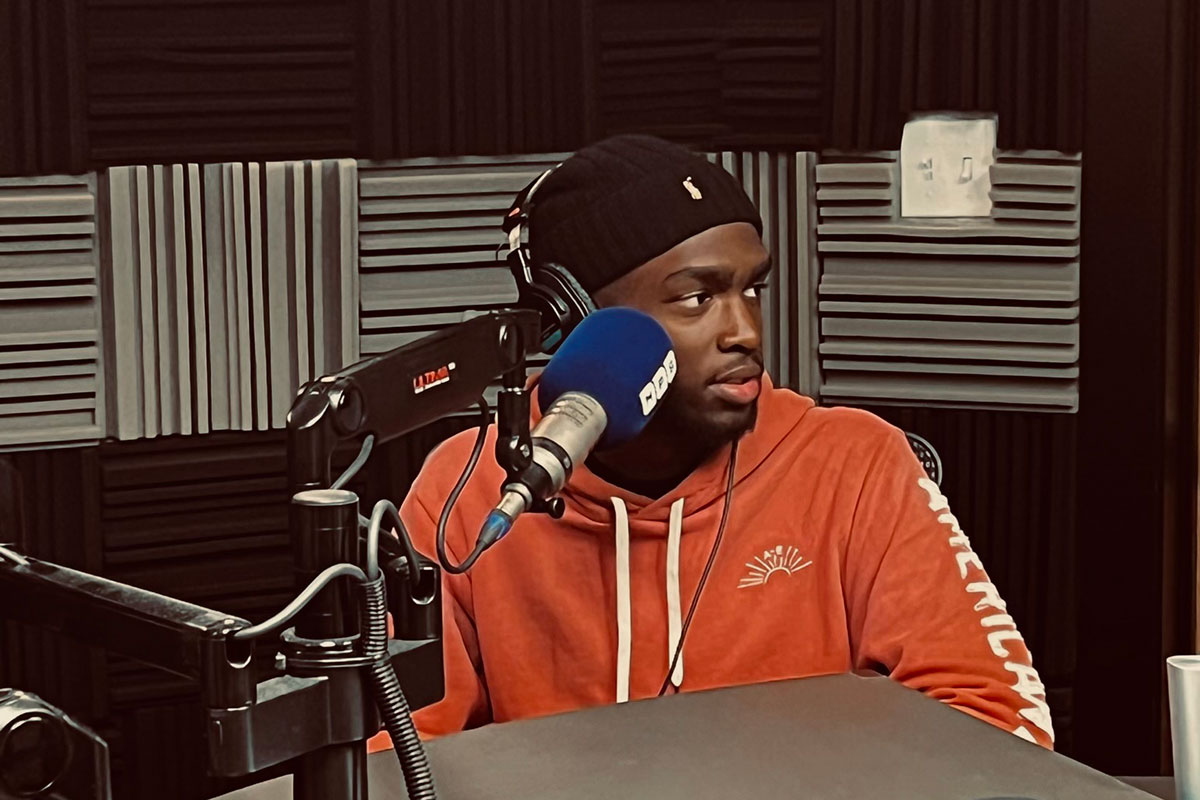
In June 2019, Kelly joined Instagram and started posting his beats. Within six months of joining the social-media platform, he caught the attention of producer Tre Gilliam, who produces a lot of music for rapper Rod Wave. Together, he and Kelly co-produced songs for Rod Wave such as “Thug Motivation”, “Shooting Star” and “Ain’t Mad At You”.
“(Working with) Youngboy (Never Broke Again), that came from me collaborating with Hitman Audio,” Kelly said. “We just found each other on Instagram, and we started making beats together. And then we sent the beat off to Youngboy’s engineer Khris James. Ever since then, we’ve just been locked in.”
Kelly’s producing moniker AKel appears in writing credits for rappers like Lil Durk, Blac Youngsta, Polo G, EST Gee, Youngboy Never Broke Again, Rod Wave and more. At only 17 years old, Kelly has produced three platinum and six gold records, along with three number-one albums.
“All of the big stuff happened during COVID, so I had a lot of downtime,” the young producer said. “I was making beats and going outside, making beats and going outside.”
Despite his success, Kelly regards his education as his highest priority in preparing for his future. The high-school senior handles homework and his extracurricular activities like band first and then produces afterward on weekends.
Producing music from his bedroom, Kelly’s setup includes an M-Audio Hammer 88-key keyboard, an MSI laptop, studio monitors, a desk, interface and hard drives. He consistently invests his earnings into new equipment or maintenance to increase the quality of his work.
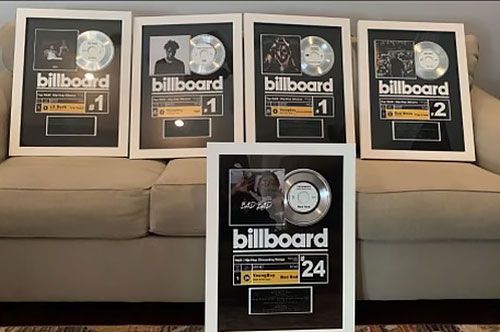
Because the music industry can at times be predatory and since Kelly had entered it at such a young age, he and his mother took precautions to ensure no one would take advantage of him through bad deals.
“I remember when I got my first producer agreement for ‘Thug Motivation’ by Rod Wave,” Kelly recalled. “I didn’t know anything about this stuff, so my mom reached out to some people, and they got me in contact with Kamel King. So my first piece of advice to anybody would be to find an entertainment attorney and try to find knowledge for yourself, too.”
Continually wanting to learn, Kelly attended the “Do the Knowledge” panel during Jackson Indie Music Week, where he networked and learned lessons about consistency, staying true to oneself as an individual and considering the business-related elements of making music.
After graduating high school, Kelly plans to attend a community college and major in business. He wants to experience college and grow as he determines his ultimate career goals. Regardless of his success, having additional skills and knowledge to fall back on if needed helps, he explained.
“I want to do more R&B (music),” Kelly said. “I would love to build with the artists that I’m close with and just grow musically as a producer, prove that I can do all genres across the board. I want to get into licensing, get my music on TV shows and movies. That’s my plan.”
‘It’s Not Jackson’s Fault’
Jackson Indie Music Week founder Brad Franklin said people will sometimes tell others that they cannot accomplish anything in Mississippi because they have not done so themselves. Franklin advises artists to not surround themselves with people who exhibit that mentality. Instead, he suggests people find those who have found success within Mississippi, people who can share their insights so that others can actualize their dreams as well.
“If you not jamming, it don’t matter what city you in,” Franklin told the audience. “Going to Atlanta ain’t going to help you. If you are the 45th rapper in Jackson, Miss., you gonna go to Atlanta and you gonna be the 2,800th best rapper in Atlanta. Stop blaming Jackson and blaming Mississippi on the fact that you ain’t jamming.”
“It’s not Jackson’s fault; it’s not Mississippi’s fault,” he added. “We’ve had too many people that have been successful from sitting right here in this city, not having gone anywhere.”
Tony Gilmer said he has learned that anybody can make it in the business no matter where they live. When he started making music, people would tell him he needed to leave, but he disagreed.
“Some people be ashamed to be where they’re from,” Gilmer said. “I’m proud to be where I’m from, and I know that if I make it from here, I can make it anywhere.”
Allen Kelly has not yet decided whether he plans to remain in Mississippi after he graduates. Only time will tell, he said.
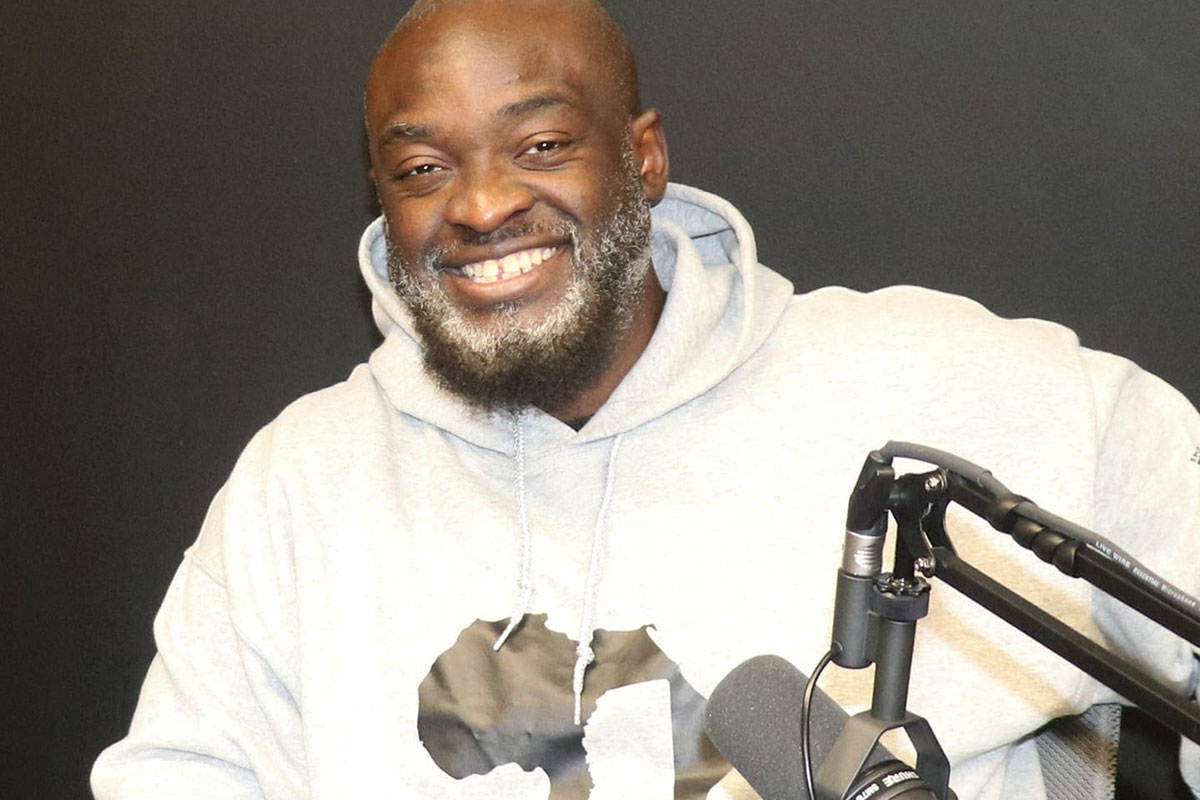
While Flowerchile spent some time living outside Mississippi, it wasn’t so she could further her career. Kristen Walker moved because she had lived in Mississippi for her entire life up to that point, and she felt it was time to venture out and explore other states.
“In my last showcase, I kind of preached the wisdom of there is truly no place like home, especially when you’re blessed to have a solid familiar background,” Walker said. “You have friends and a community that actually support you—because I was isolated when I was in Louisiana and in Georgia.”
The singer noted that going to larger markets does mean artists face a greater level of competition. She also missed the sense of community and hospitality she knew from Jackson and Mississippi at large. Despite her experience, however, she asserted that her journey has helped her grow in ways that are aiding her now that she is back in her home state.
“I found a sense of self out there that I didn’t have before I moved,” Walker said. “I found the level of independence that I didn’t have before moving. And I think grown people coming into adulthood, I think that’s important. I think you need to know how to take care of yourself. I think you need to know what you actually like (instead of) trying to live up to the perceived version of yourself.”
Listen to TG-18’s nine EPs and three albums on Spotify page, or follow him on Facebook, Twitter or Instagram to keep up with his latest projects. Flowerchile’s new singles—“Self Care”, “We Found Love”, and “Sexy Dreams”—are available on Spotify. For any inquiries, she can be reached by email at flowerchilechild@gmail.com or through her Instagram page. AKel can best be reached by email at prodbyak@gmail.com or through his Twitter or Instagram accounts.






